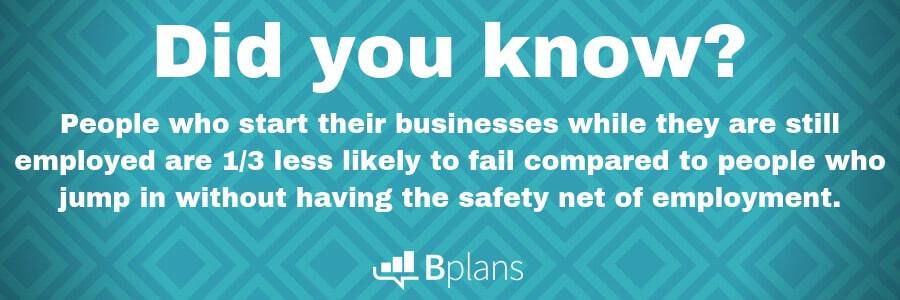
“I quit!”
Don’t those two magic words sound like music to your ears if you have been dreaming of starting a company? You bet.
But for anyone considering quitting their job to start their own company, there are plenty of potential roadblocks—usually around the idea of giving up your regular paycheck for a while— from your kids’ tuition fees to your mortgage.
You can’t begin to think of quitting your job to start your own business unless you have enough money to take care of your priorities and liabilities.
Right? Not necessarily.

The hybrid path to entrepreneurship
There is another way—“a hybrid path to entrepreneurship,” which basically involves starting a business while you’re still employed.
Consider Bob Parsons, the founder of GoDaddy Hosting. Prior to starting GoDaddy, Parsons founded another company called Parsons Technology. He started that company in 1984, but he didn’t quit his day job until late 1987, when he was ready to focus solely on his startup.
Parsons is not unique; many other eminent and successful entrepreneurs kept their day job while starting a business. According to an Academy of Management study, people who start their businesses while they are still employed are 1/3 less likely to fail compared to people who jump in without having the safety net of employment.
Now that’s a good news. What’s better than having a day job (a.k.a. your steady source of income) as well as a chance to pursue your dream startup?
But that’s easier said than done. Remember you’re still probably working 9 to 5 or more and then hustling at night to take care of your business.
With that said, it is not impossible. If you follow some of these simple ground rules mentioned below, it becomes somewhat easier to walk the fine line between keeping up your full-time job and pursuing your own business.
1. Organize your time
Time is perhaps your most valuable asset, especially when you are already working 40-plus hours a week for your employer. Don’t forget the time you need to set aside for family, to get proper rest, and do other human things. You should, therefore, be really skillful with your time management if you want to devote some dedicated hours to your business.
Get everything written down in a calendar—whether you’re using a paper day planner or Google calendar. Don’t skip anything. Include all your commitments, and divide each task into achievable-sized bits. Don’t be afraid to schedule specific blocks of time for particular projects, rather than just writing down meetings.
Look for dead time such as lunch hours, your commute time, or free times during vacation days, and so on to develop your website, write a blog, or send out pitches. Have small and realistic goals and always remember to keep the balance.
2. Test your ideas
You may believe to have a great idea, but the market may not agree to that. It is therefore essential to test them thoroughly before launching your startup.
But before that, there are a few questions you need to answer:
- Does your idea(s) solve a pain point?
- Do you have a product?
- What’s its USP (unique selling proposition)?
- Who is your target audience?
- How will you distribute your product?
- What are your major costs?
- What are your sources of revenue?
Once you have these answers, it’s time to test your idea in the real world.
Here are a few ways you can do this:
- Create a prototype of your product that meets your customers’ biggest pain point and get user feedback (including seeing if they’ll pay for it) in order to validate the product even before launching it.
- Similarly, service providers can start with freelancing to build a client base years before they actually start the business.
- Interview your target audience to see if they actually have the pain point, which you are about to solve.
- Conduct surveys to reach hundreds and thousands of target audience and analyze the result. While it is like an extension of customer interviews, you can ask more closed questions and tools like SurveyMonkey makes it even easier to analyze the results.
3. Don’t cross your current employer
No matter how much you hate your current job, never cross the line with your employer. You really don’t want to get dirty on the legal grounds.
So, make sure your startup is not an exact replica of your current organization. In fact, it is better to have a business idea which is unrelated to your day job. Also, never use your corporate computers or equipment to do works related to your business and never do them during your office hours.
Make sure you are in compliance with your non-disclosure agreement and any other employment agreements that you have signed. Your employer clearly won’t appreciate it you become their direct competitor. If you are planning to start a competing business, speak to a lawyer to ensure that you are on solid legal grounds before you start your own business.
It’s better to maintain a strong relationship with your employer if you can. For example, if you are a digital marketer and want to launch your own startup, see if you can negotiate working with your employer on a freelance basis to free up your time. This way your employer gets to keep you for longer and you can gradually start on your business without any legal issues.
4. Analyze your business’s success before registering with the IRS
While you do need to register your company on a federal level, don’t do it any earlier than you really need to. Note that not all businesses need a tax ID (EIN) from the Internal Revenue Service (IRS).
You need this only when you:
- Run a corporation or a business partnership
- Have employees, or
- Meet certain IRS criteria
But until you reach that point or if you still have a long way to go before you launch, you can have the liberty of not registering.
What is the point of creating unnecessary work at the time when every moment and resource counts? However, you must register with IRS as soon as you meet any one of its criteria. No excuses there. Remember, whether you’re registered as a business or not, you’ll still need to report income and pay taxes on it.
5. Look for a co-founder
Starting a business is difficult and it gets even more challenging if you try to do it alone.
Of course, there are many examples of solo founders, and sometimes it’s easier and makes financial sense do go alone. Having a good co-founder who compliments your skill sets and shares your dreams and passion can be helpful. Co-founders can not only add to your company’s competencies, but can also challenge your ideas along the way—many times that can help you be more effective.
On the flip side, a fundamental disagreement with a co-founder can tank your startup. So make sure your co-founder’s approach and vision is compatible with the way you work or think. It is usually best to get someone you have worked with earlier on board than going with a stranger. Just be sure to put your agreement with your co-founder in writing, especially in terms of their ownership or equity stakes so there aren’t any surprises if you end up parting ways.
6. Focus on local networking
Launching a startup is challenging, both financially and emotionally, and you may not always have your family and friends’ support in your entrepreneurial pursuits.
So, reach out to others who are also starting their own businesses. Find a community of supportive entrepreneurs; this will not only help you to get that much needed emotional support, but will also help you learn from their experience.
SCORE can help you find an experienced business mentor. Also check out sites like like Meetup, The Savvy Community (for women entrepreneurs), Nomad List, YEC, and so on. There are even private Facebook groups like Freelance to Freedom Project Community and many LinkedIn groups that aspiring entrepreneurs should consider joining.
Conclusion
Quitting a full-time job to start your business is perhaps one of the biggest decisions you will ever make.
But, you might not have to take that risk immediately.
It is often a good idea to walk the thin line between maintaining your full-time job and preparing the foundation of your startup, although it will no doubt be challenging. At least you’ll have the financial support and stability you need to test your idea and decide if it has legs.
Just get started, and take small steps towards your dreams.
from Bplans Articles https://ift.tt/2AnCiHl

No comments:
Post a Comment